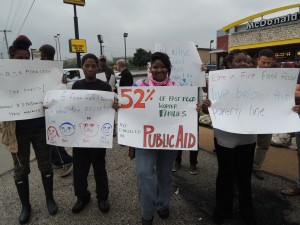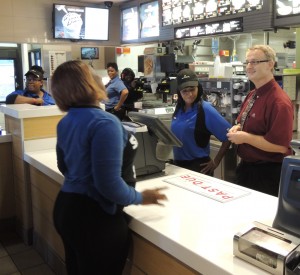Low-wage fast food jobs cost taxpayers $7 billion annually

– Labor Tribune photo
By TIM ROWDEN
Associate Editor
Ferguson – Low-wage fast food jobs cost Americans nearly $7 billion every year in public assistance programs many workers rely on to make ends meet because their jobs don’t pay enough.
That comes to $146 million a year for Missouri taxpayers and $368 million a year for Illinois taxpayers, according to a new report from the University of California-Berkeley’s Center for Labor Research and Education.
The report, “Fast Food, Poverty Wages: The Public Cost of Low-Wage Jobs in the Fast Food Industry,” breaks down by state exactly how many fast food workers rely on Medicaid, the Earned Income Tax Credit and other public benefit programs – and at what cost to taxpayers – because their wages are so low.
St. Louis area fast food workers and community members reacted to what the researchers called “staggering” findings about the extent to which Americans are forced to cover fast-food workers’ food, healthcare and other basic needs by holding a rally and press conference outside the corporate-owned McDonalds at 9131 W. Florissant Ave. in Ferguson.
Employees took turns talking about their experiences struggling to raise families and covering medical costs on their salaries.
ABUSING THE SYSTEM
Charles Eden, 20, an employee at the Wendy’s at 9604 Manchester Road in Rock Hill, said he makes $7.60 an hour after working at the restaurant for two years. When he sprained his arm recently, he had to work with a sling, because he couldn’t afford to miss work. “I need all my hours just to pay my rent,” he said.
“It’s unfair that these big corporations like McDonald’s, Wendy’s and Burger King are making billions of dollars every year and the money is not trickling down to the workers who can’t afford the basic necessities of life. They’re taking advantage of the workers, the taxpayers and the government. They’re just abusing these systems that the government has in place as just a safety net. It ain’t right.”
One of those in attendance was University of Missouri-St. Louis Associated Professor of History Gerda Ray.
“People have this silly idea that fast food workers are just here for six months, just here for nine months – these are [their] jobs. Most fast food workers are in their 20s and 30s, two thirds of them are the heads of household, and two-thirds of them are parents. These are people who need and deserve to make a living wage.”
CREATE A LIVING WAGE
Representative Jake Hummel (D-St. Louis), minority floor leader of the Missouri House of Representatives and a member of IBEW Local 1, argued for higher wages, saying tax breaks for corporations and substandard wages for workers was not the answer.
“Trickle down does not work,” Hummel said. “We have to create a living wage where workers can actually go out and not have to work 80 or 90 hours a week to get by – and let’s be honest, that’s if they give you 40 hours a week at this job, and we know that’s not the case.”
After the press conference, the fast food workers and activists went inside the McDonald’s and presented a “Past Due” bill for $7 billion to the store’s manager.
The manager, accompanied by a closely-watching representative from the McDonald’s corporate office, had no comment.
The STL Can’t Survive on 7.35 Campaign has been actively protesting for higher wages and the right to form a union since May. In August, fast-food workers in 60 cities across the country went on strike, calling for higher wages, so they don’t have to rely on public assistance programs to get by.
The Service Employees International Union (SEIU) is providing financial and technical support to the campaigns throughout the country and is lending staff to help train organizers on the ground.
“People who serve food should be paid enough not only to afford groceries and rent but to put a little money back into their neighborhoods” said the Rev. Martin Rafanan, community director of STL Can’t Survive on $7.35. “Seven billion dollars is a huge amount of money that fast food companies are draining out of our communities. It would be much better if that money could be spent improving our schools, fixing our roads or creating good-paying jobs.”
You can find out more and help the fast food workers by going to STL735.org, following #STL735 on Twitter, or liking facebook.com/STL735.
Report finds substantial public-assistance needs among fast food workers

– Labor Tribune photo
Researchers at the University of California-Berkeley’s Center for Labor Research and Education say the fast food industry’s low wages and meager benefits, often accompanied by part-time hours, combine to create substantial public-assistance needs, including:
• Medicaid and the Children’s Health Insurance Program – $3.9 billion per year
• Earned Income Tax Credit payments – $1.95 billion per year
• The Supplemental Nutrition Assistance Program, or food stamps –$1.04 billion per year
• Temporary Assistance for Needy Families – $82 million per year
Even full-time hours are not enough to compensate for low wages, the Labor Center’s recent report “Fast Food, Poverty Wages: The Public Cost of Low-Wage Jobs in the Fast Food Industry” found.
“The taxpayer costs we discovered were staggering,” the report’s co-author Ken Jacobs said. “People who work in fast-food jobs are paid so little that having to rely on public assistance is the rule, rather than the exception, even for those working 40 hours or more a week.”


Leave a Reply